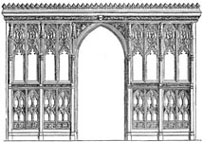
The New Surge of Converts to Rome from Protestantism
GETTING ORGANIZED
Conversions to the Catholic Church from the ranks of Protestantism are not new. But when, in the space of a few years, a critical mass of Protestant clergy and non-ordained church workers make arduous journeys toward Rome, the observer can’t help taking notice. An organization called The Network, consisting of individuals and families, has emerged to offer solace and support for these journeys. It co-ordinates what may well become a historic movement toward the Catholic Church.
The Network is not to be confused with the Pastoral Provision, which is primarily oriented to enabling married Episcopal priests to enter the Catholic priesthood. The Network, in contrast, is primarily oriented to non-Episcopalians, and does not usually have the priesthood as the ultimate goal. Headquartered at the Franciscan University of Steubenville (Ohio) under the leadership of former Presbyterian minister Marcus Grodi, The Network draws together a seemingly disparate collection of people who have been, are, or hope to be involved in the conversion process.
The ecclesial cultures from which the converts come span the gamut: fundamentalist, charismatic, evangelical, Calvinist, mainline Protestant, and even high-church Anglican. The actual roads traversed are by no means identical, and the footprints that remain indicate many detours in the journeys. But most of these differences are due to individual inclinations and ecclesial backgrounds from which these pilgrims have come. The common elements in the stories arise from the object to which they are moving or have moved, elements that have four dimensions: ecclesial, historical, sacramental, and spiritual.
Members of The Network share the universal longing of all converts to Catholicism, to be united to the one universal Church. Many have noted a lack of legitimate authority in their churches. Dave, a former fundamentalist minister, and his wife Colleen began their journey to the Church when they saw how arbitrary were the doctrines and biblical interpretations of their background. The only ground for those doctrines and interpretations seemed to be Dave and Colleen themselves, or a group of independent Bible churches. The persistent problem of how to decide between competing interpretations of a text dogged them. Even those from more established traditions with credal and synodical statements asked how they could know that these statements, not others, represent the correct interpretations of the Bible. Others were troubled by the epistemological and moral relativism in contemporary American culture that has infected their churches.
You May Also Enjoy
The fireplace without the fire is empty ritual and mere churchianity. The fire without the fireplace is chaos and hairsplitting and division.
Before answering the question, “Why Rome?” I must respond to another: “Why not Takoma Park?” (Takoma Park, Maryland, is the world headquarters of Seventh-Day Adventism.)
Clare Boothe Luce wrote that most converts, like herself, "enter God's kingdom through the gates of pain."

